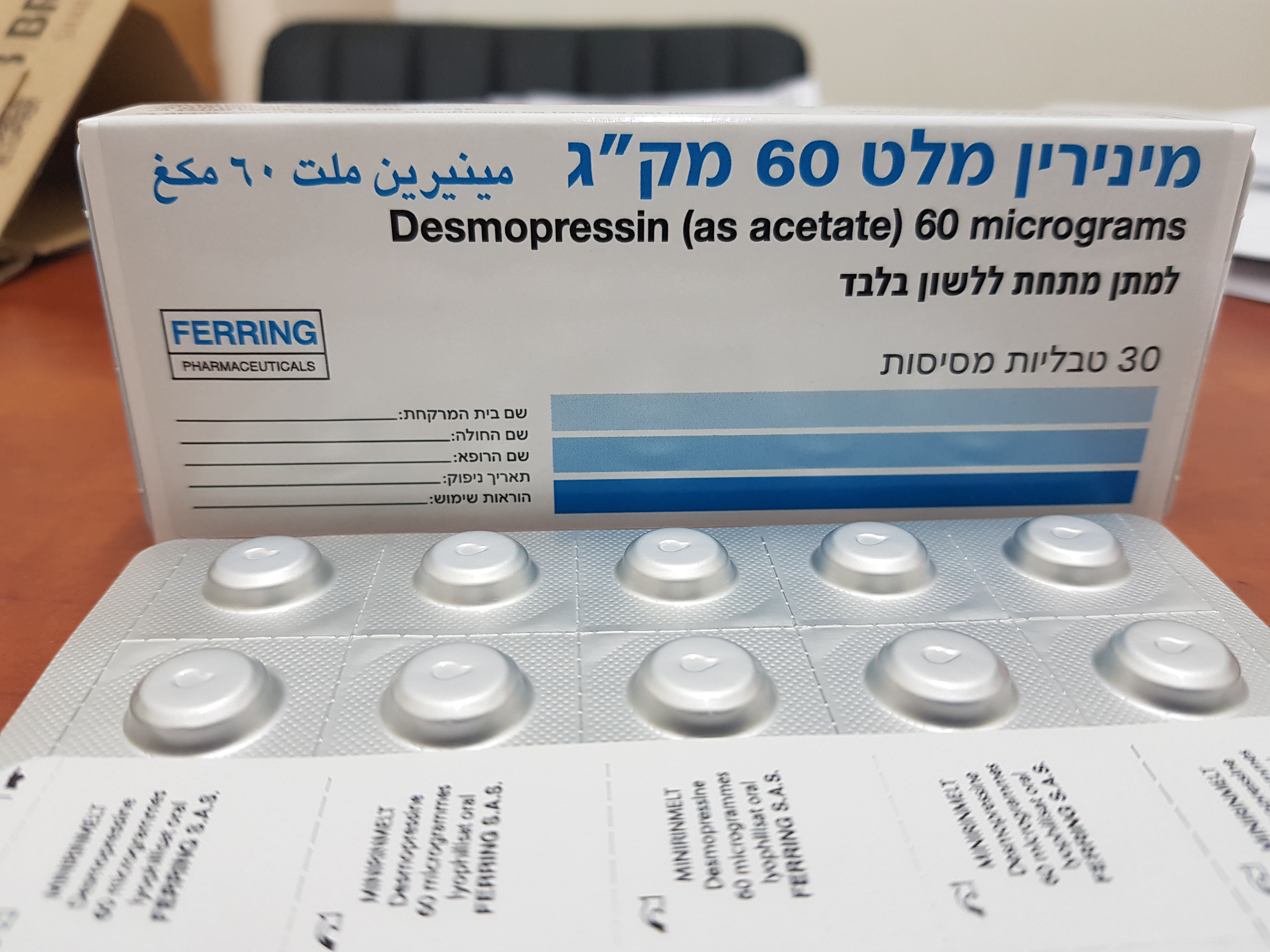Quest for the right Drug

מינירין מלט 60 מק"ג MINIRIN MELT 60 MCG (DESMOPRESSIN AS ACETATE)
תרופה במרשם
תרופה בסל
נרקוטיקה
ציטוטוקסיקה
צורת מתן:
מתחת ללשון : SUBLINGUAL
צורת מינון:
טבליות מסיסות : TABLETS SOLUBLE
עלון לרופא
מינוניםPosology התוויות
Indications תופעות לוואי
Adverse reactions התוויות נגד
Contraindications אינטראקציות
Interactions מינון יתר
Overdose הריון/הנקה
Pregnancy & Lactation אוכלוסיות מיוחדות
Special populations תכונות פרמקולוגיות
Pharmacological properties מידע רוקחי
Pharmaceutical particulars אזהרת שימוש
Special Warning עלון לרופא
Physicians Leaflet
Adverse reactions : תופעות לוואי
4.8 UNDESIRABLE EFFECTS Summary of the safety profile The most serious adverse reaction with desmopressin is hyponatraemia, which may cause headache, nausea, vomiting, , weight increase, malaise, memory impairment, vertigo, falls, dizziness, confusion, and in severe cases convulsions and coma. The majority of adults treated for nocturia who develop hyponatraemia have developed low serum sodium after three days of dosing. In adults the risk of hyponatraemia increases with increasing dose of desmopressin and the risk has been found to be more prominent in women. In adults the most commonly reported adverse reaction during treatment was headache (12%). Other common adverse reactions were hyponatraemia (6%), dizziness (3%), hypertension (2%), and gastrointestinal disorders (nausea (4%), vomiting (1%), abdominal pain (3%), diarrhoea (2%) and constipation (1%)). Less common is an influence of the sleep pattern/consciousness level presenting itself as e.g. insomnia (0.96%), somnolence (0.4%) or asthenia (0.06%). Anaphylactic reactions have not been seen in clinical trials but spontaneous reports have been received. In children the most commonly reported adverse reaction during treatment was headache (1%), less common were psychiatric disorders (affect lability (0.1%), aggression (0.1%), anxiety (0.05%), mood swings (0.05%), nightmare (0.05%)) which generally abated after treatment discontinuation and gastrointestinal disorders (abdominal pain (0.65%), nausea (0.35%), vomiting (0.2%) and diarrhoea (0.15%)). Anaphylactic reactions have not been seen in clinical trials but spontaneous reports have been received.Tabulated summary of adverse reactions Adults Based on the frequency of adverse drug reactions reported in clinical trials with oral desmopressin conducted in adults for treatment of Nocturia (N=1557) combined with the post marketing experience for all adult indications (incl Central Diabetes Insipidus). Reactions only seen in post marketing have been added in the ‘Not known’-frequency column. MedDRA Very Common Uncommon Rare Not known Organ Class common 1-10%) 0.1-1%) 0.1-0.01%) (>10%) Immune system Anaphylactic disorders reaction Metabolism and Hyponatraemia* Dehydration**, nutrition Hypernatraemia** disorders Psychiatric Insomnia Confusional disorders state* Nervous system Headache* Dizziness* Somnolence, Convulsions*, disorders paraesthesia Asthenia**, Coma* Eye disorders Visual impairment Ear and Vertigo* labyrinth disorders Cardiac Palpitations disorders Vascular Hypertension Orthostatic disorders hypotension Respiratory, Dyspnoea thoracic and mediastinal disorders Gastrointestinal Nausea* , disorders Abdominal Dyspepsia, pain* Flatulence, Diarrhoea bloating and Constipation, distension Vomiting*, Skin and Sweating, Dermatitis subcutaneous Pruritus, allergic tissue disorders Rash, Urticaria Renal and Bladder and urinary disorders urethral symptoms General Oedema disorders and Fatigue Malaise*, administration Chest pain, site conditions Influeza like illness Investigations Weight increased*, Hepatic enzyme increased, Hypokalaemia * Hyponatraemia may cause headache, abdominal pain, nausea, vomiting, weight increase, dizziness, confusion, malaise, memory impairment, vertigo, falls and in severe cases convulsions and coma ** Only seen in the CDI indication Children and Adolescents: Based on the frequency of adverse drug reactions reported in clinical trials conducted in children and adolescents with oral desmopressin for treatment of Primary Nocturnal Enuresis (N = 1923). Reactions only seen in post marketing have been added in the ‘Not known’-frequency column. MedDRA Very Common Uncommon Rare Not known Organ Class common 1-10%) 0.1-1%) 0.1-0.01%) (>10%) Immune system Anaphylactic disorders reaction Metabolism and Hyponatraemia* nutrition disorders Psychiatric Affect Anxiety Abnormal disorders lability**, symptoms, behaviour, Aggression*** Nightmare****, Emotional Mood disorder, swings**** Depression, Hallucination, Insomnia Nervous system Headache* Somnolence, Disturbance in disorders attention, Psychomotor hyperactivity, Convulsions* Vascular disorders Hypertension Respiratory, Epistaxis thoracic and mediastinal disorders Gastrointestinal Abdominal disorders pain* Nausea* Diarrhoea Vomiting*, Skin and Dermatitis subcutaneous tissue allergic, Rash, disorders Sweating, Urticaria Renal and urinary Bladder and disorders urethral symptoms General disorders Oedema Irritability and administration peripheral site conditions Fatigue * Hyponatraemia may cause headache, abdominal pain, nausea, vomiting, weight increase, dizziness, confusion, malaise, memory impairment, vertigo, falls and in severe cases convulsions and coma ** Post marketing reported equally in children and adolescents (<18 years) *** Post marketing almost exclusively reported in children and adolescents (<18 years) ****Post marketing reported primarily in children (<12 years) Other special populations: Elderly patients and patients with serum sodium levels in the lower range of normal may have an increased risk of developing hyponatraemia (see section 4.4). Reporting of suspected adverse reactions Reporting suspected adverse reactions after authorisation of the medicinal product is important. It allows continued monitoring of the benefit/risk balance of the medicinal product. Healthcare professionals are asked to report any suspected adverse reactions. Any suspected adverse events should be reported to the Ministry of Health according to the National Regulation by using an online form https://sideeffects.health.gov.il/

שימוש לפי פנקס קופ''ח כללית 1994
Short term treatment of primary nocturnal enuresis (patients over 5 years who have the ability to concentrate urine)
תאריך הכללה מקורי בסל
01/01/1995
הגבלות
תרופה שאושרה לשימוש כללי בקופ'ח
מידע נוסף
עלון מידע לצרכן
15.09.20 - עלון לצרכן אנגלית 15.09.20 - עלון לצרכן עברית 15.09.20 - עלון לצרכן ערבית 03.11.22 - עלון לצרכן אנגלית 03.11.22 - עלון לצרכן עברית 03.11.22 - עלון לצרכן ערבית 23.08.23 - עלון לצרכן אנגלית 23.08.23 - עלון לצרכן עברית 23.08.23 - עלון לצרכן ערבית 14.06.15 - החמרה לעלון 03.02.20 - החמרה לעלון 20.08.20 - החמרה לעלוןלתרופה במאגר משרד הבריאות
מינירין מלט 60 מק"ג